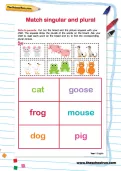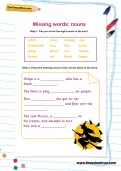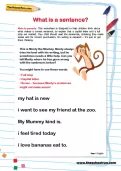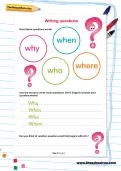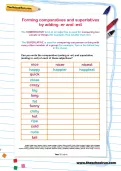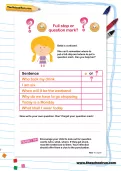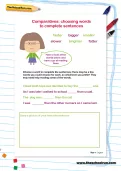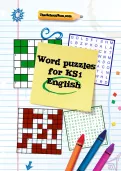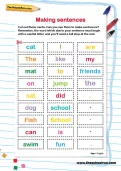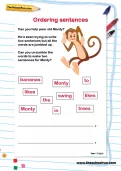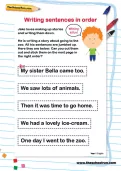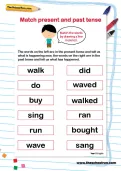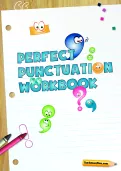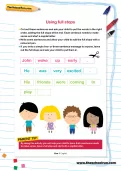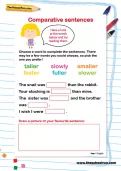Year 1 Grammar worksheets
Free worksheets: Grammar, KS1, Y1
You’ll need to login or Register first to access these worksheets for free.
Once you’ve tried out our free worksheets, why not explore all our resources (1000s of worksheets, interactive tutorials, learning packs and more) with a 14-day FREE trial subscription.
Match singular and plural
This worksheet is designed to help your child understand how to say the singular and plural versions of different animals' names.
Missing words: nouns
Spot the nouns then place the missing nouns in the correct place in the story.
What is a sentence?
This worksheet gives sentences that need correcting with regards to word order or punctuation.
Writing questions
Read these questions words then use the words to write some questions. Don’t forget to include your question marks!
Writing questions with wh words
Can you write some questions in the speech bubbles using the ‘wh words’ to help? Don’t forget your question marks!
Turning nouns into adjectives
A word can be changed from a noun into an adjective by adding a -y on the end. Can you complete these sentences with the missing adjectives?
Forming comparatives and superlatives by adding -er and -est
Can you write the comparative (ending in -er) and superlative (ending in -est) of each of these adjectives? Remember, the comparative form of an adjective is used for comparing two people or things (for example, Tom is taller than me). The superlat ive is used for comparing one person or thing with every other member of a group (for example, Tom is the tallest boy in the class).
Roll the word die sentences
Cut out the shape below. Fold along the lines and stick the flaps to make a cube. Then roll your word die and write down a sentence with that word in it. Don’t forget capital letters and full stops! Get
your mum and dad to have a go too! Who can write the silliest sentence?
your mum and dad to have a go too! Who can write the silliest sentence?
Full stop or question mark?
Bella can’t remember where to put a full stop and where to put a question mark. Can you help her?
Comparatives: choosing words to complete sentences
Choose a word to complete the sentences; there may be a few words you could choose for each, so whichever you prefer!
Word puzzles for Key Stage 1 English
Take a break from homework and spelling drills with this collection of word puzzles for Key Stage 1! Each one covers a different concept that your child will learn in English lessons, but presents it as something to solve by remembering what they've been taught in class.
Question marks practice
Have your child decide which sentences need question marks, and which need full stops.
Making sentences
Words for your child to cut out and then re-order into sentences. This activity will help them with understanding word order and how to use capitals and full stops.
Match singular and plural
This worksheet is designed to help your child understand how to say the singular and plural versions of different animals' names.
Ordering sentences
Use this worksheet to help your children to re-order words to make sentences that make sense and have capitals and full stops.
Singular and plural
This worksheet consists of singular and plural names of animals that children need to match up.
What is a sentence?
This worksheet gives sentences that need correcting with regards to word order or punctuation.
Writing sentences in order
This worksheet gives sentences that can be cut up and re-ordered to help children with structuring text.
Match present and past tense
This worksheet gives jumbled-up verbs in the present and past tense. Children need to match each present tense verb to its past tense form.
Perfect Punctuation Workbook
Full stops, commas, semi colons, apostrophes… Whatever aspect of punctuation your child is grappling with, we’ve come up with a bumper pack of 60 activities to help them practise, as well as a parent's refresher guide to each punctuation mark and how it's used.
Using full stops
This Key Stage 1 writing worksheet will help your child to recognise and use full stops and capital letters.
Comparative sentences
Use this worksheet to encourage your child to use comparative words ending in 'er' to complete the given sentences.
Using question marks
Full stop or question mark? Help your child know when to use which one by putting the correct mark at the end of these sentences.
